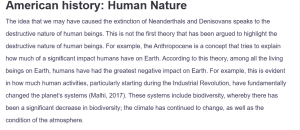American history: Human Nature
The idea that we may have caused the extinction of Neanderthals and Denisovans speaks to the destructive nature of human beings. This is not the first theory that has been argued to highlight the destructive nature of human beings. For example, the Anthropocene is a concept that tries to explain how much of a significant impact humans have on Earth. According to this theory, among all the living beings on Earth, humans have had the greatest negative impact on Earth. For example, this is evident in how much human activities, particularly starting during the Industrial Revolution, have fundamentally changed the planet’s systems (Malhi, 2017). These systems include biodiversity, whereby there has been a significant decrease in biodiversity; the climate has continued to change, as well as the condition of the atmosphere.
Due to innovation, humans have introduced the most toxic substances to earth, such as radioactive material; there are tons of plastic and other foreign elements in the ocean and just about every other place in the world. To expand our territories, we have managed to significantly clear out forests, which reduces the biodiversity of plants and animals, and some are killed in the process or forced to migrate to areas unsuitable for them. The carbon levels are reaching new highs due to air pollution on top of poisoning ourselves with processed foods as well as poisoning animals with antibiotics. Not only have we managed to make the planet dirtier and uninhabitable, but we have also managed to kill each other in masses. For example, when exploration was being done, people who came to new places would bring diseases that would kill large populations. The desire to grow and innovate can be advantageous; however, there is also a tendency toward greed in the relentless pursuit of creating or discovering new things. This drive often leads to significant unforeseen consequences that have persistently harmed the planet.
References
Malhi, Y. (2017). The concept of the Anthropocene. Annual Review of Environment and Resources, 42(1), 77-104. https://doi.org/10.1146/annurev-environ-102016-060854
ORDER A PLAGIARISM-FREE PAPER HERE
We’ll write everything from scratch
Question
Human Nature
In our first lecture and reading, we saw how early humans (Homo Sapiens) diverged from and interacted with other closely related hominin species like Neanderthals and Denisovans. I would like you to address one (or more) of the following questions for your first journal entry:
- a. Should Neanderthals and Denisovans be considered human? Why or why not?
- b. We may have caused the extinction of Neanderthals and Denisovans. What does this say about our “human nature?”
- c. Homo Sapiens living 100,000 years ago had identical brains to ours, but did they think like us? Why or why not?
American history: Human Nature
There is no minimum or maximum length required for your discussion board posts. But I want your answers to demonstrate clearly demonstrate your point of view and how you arrived at that positions. So, not something like, “I think they should, because that’s how I feel.” Your post does not have to start a new thread; you can also receive credit by replying to one of your classmates, as long as your reply is substantial and not simply “I agree,” “I disagree,” or similar. Please let me know if you have any questions.
Finally, please do not use ChatGPT on the discussion board. I will delete any obvious AI responses and you will not receive credit.


